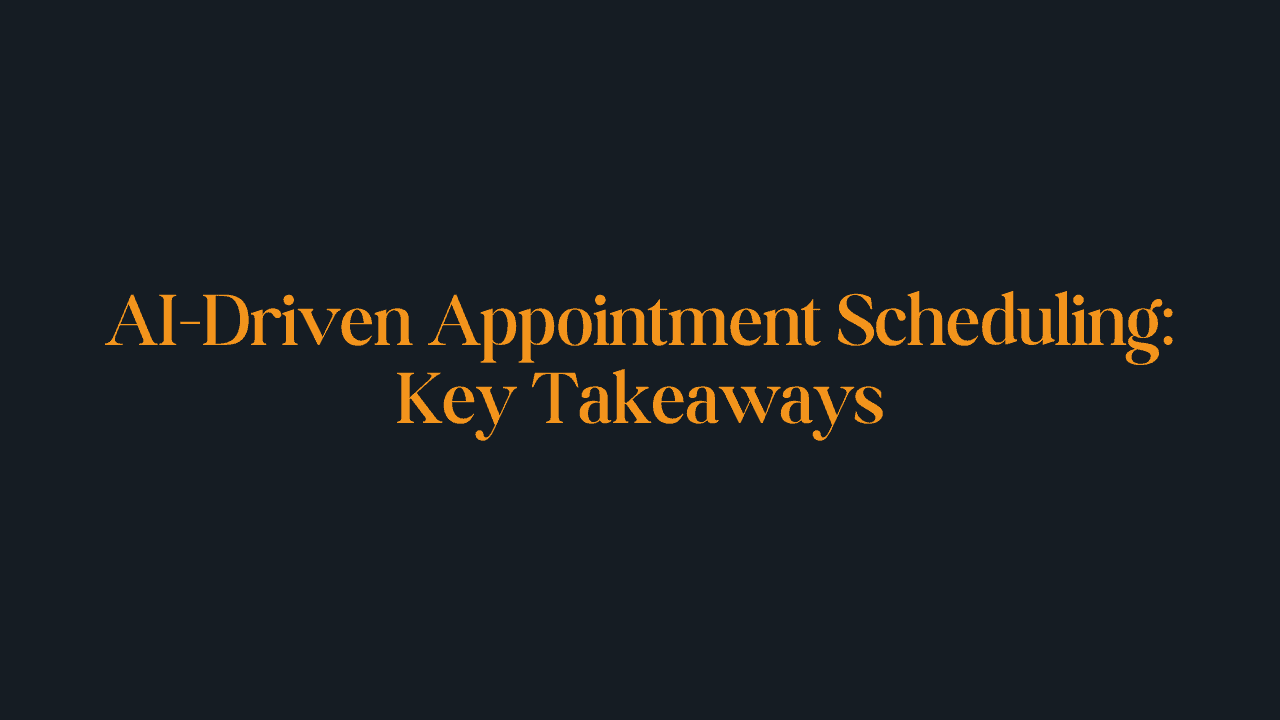
In the rapidly digitizing world, technology has come to play a prominent role in the way we live and function, not excluding something as seemingly trivial as scheduling appointments. Enter AI-Driven Appointment Scheduling, a game-changing innovation that leverages artificial intelligence to simplify and enhance the process of managing appointments. This has effectively revolutionized various industries, disrupting traditional methods of operation, be it in the healthcare sector, the service industry, or corporate offices.
This article navigates the intricacies of AI-Driven Appointment Scheduling, dolling out critical insights into its workings, its vast benefits, and how it boosts customer experiences while optimizing resource management. Further, it presents an in-depth exploration of its integration with other systems and addresses potential challenges and concerns that can emerge.
Additionally, it provides a comprehensive cost-benefit analysis and delves into the future trends in AI scheduling. Travel with us on a journey of understanding the potential of AI-Driven appointment scheduling and its implications in the contemporary business environment.
How AI-Driven Scheduling Works
AI-driven scheduling is founded on the principles of machine learning, a subset of Artificial Intelligence (AI) that helps systems learn from data, identify patterns and make decisions with minimal human intervention. At its core, the software utilizes complex algorithms, natural language processing and context awareness to sift through reams of data and empirically detect patterns and trends.
Without needing human input, the software can analyze past schedules, various team members' availabilities, meeting locations, and set appointment times that are feasible for all parties involved.
A quintessential example of AI-driven scheduling at work is the automated scheduling of client or patient appointments in industries such as healthcare or customer service. The AI-driven schedulers take into consideration all the factors: time zones, working hours, preferred time of contact, and even traffic conditions.
They coordinate between different stakeholders, sending out invites, RSVPs, reminders, and cancellations accordingly. This seamless coordination not only streamlines the scheduling process but also reduces the likelihood of double bookings, missed meetings, or other mix-ups that often plague manual scheduling. All these while the users, be it a doctor or a service technician, can focus on their primary work without the distraction of administrative tasks.
Benefits of AI-Driven Appointment Scheduling
One of the obvious advantages of incorporating AI-driven appointment scheduling is improved efficiency. This smart solution can manage multiple calendars, reschedule appointments based on priority, and make sure there are no double bookings. The algorithm's meticulous precision voids human errors, ensuring that every slot is strategically filled. It significantly minimizes the time administrators spend scheduling, and allocates it to more pertinent tasks, ultimately boosting productivity levels.
On the other hand, tailored customer service is another benefit of deploying AI in scheduling. The system can identify past behaviors and preferences of clients, consistently providing deeply personalized booking experiences.
For example, if a customer prefers morning slots, the AI will prioritize these timing for future bookings. Besides, with AI, businesses can send automated reminders to clients, reducing chances of no-shows and improving client engagement. Essentially, AI-driven appointment scheduling serves as a bridge between an organization's efficiency and improved customer satisfaction.
Enhancing Customer Experience
With AI-driven appointment scheduling, a new era in customer experience has unfolded. The advanced system offers a seamless interface for customers, allowing them to schedule appointments at their convenience without the need for back-and-forth communication with representatives. Not only does this offer unmatched flexibility, but it also saves the customers from the hassle of grappling with confusing interfaces or dealing with unavailable representatives. This adds significant value to their interaction with the service, leaving a positive impression and even enhancing brand loyalty.
Furthermore, AI-enabled systems can learn from each interaction, adapting to the specific needs and preferences of the customer. This aspect enables the provision of personalized service right from the appointment scheduling phase. For instance, a customer who often schedules appointments in the early morning hours may be shown these slots as default options, thereby simplifying their process and further improving their user experience.
In essence, AI-driven appointment scheduling systems are fast proving themselves to be not just tools of convenience but instruments of customer satisfaction. With AI in play, the customer is indeed king.
Optimization of Resource Management
One of the foremost benefits offered by AI-driven appointment scheduling is the marked increase in resource management efficiency. By handling the overwhelming tasks of scheduling and organization, AI tools free up valuable human resources to be deployed in more critical, strategic roles.
Let's consider this scenario: An organization has multiple branches across the world, each with varying time zones, events, and appointment types; managing this manually may lead to errors and inefficiencies. AI can automate this process by considering these variables, thus optimizing resource allocation.
Moreover, AI-driven scheduling systems have a remarkable ability to make quick, data-based decisions which are crucial in resource management. Using machine learning, these systems can analyze patterns in appointment bookings, identify peak times, and allocate resources accordingly, thereby preventing any wastage and maximizing productivity.
Even when fluctuations or unforeseen circumstances arise, AI is quick to adapt and scale its resource allocation in real time, thereby ensuring the smooth functioning of the scheduling process. The simple inclusion of Intelligent bots in booking procedures can open organizations to a whole new dimension of efficient, progressive, and flexible resource management.
Integration with Other Systems
One of the most substantial advantages of AI-driven appointment scheduling systems is their capacity to seamlessly interact with a host of other business applications. Such systems can join forces with Customer Relationship Management (CRM) software to facilitate the sharing of crucial customer data. This enables a holistic view of customer behavior, making it easier to track appointments, contact information, service history, and interactions across every touchpoint.
Moreover, the integration capabilities of these systems extend to HR software and workforce management systems, permitting the intelligent allocation of tasks based on employee availability or skillsets. This kind of smart scheduling can minimize redundancy, and maximize productivity. Furthermore, integrating with marketing systems and social media platforms allows businesses to engage with their customers on a proactive basis, thereby fostering stronger relationships. Businesses are finding that system integration is not just a perk, but a necessity, given the moving parts that make up 21st-century enterprises.
Addressing Challenges and Concerns
Despite the numerous benefits that AI-driven scheduling brings to the table, there are still challenges and concerns that need to be addressed. One significant challenge that businesses face lies in refining the artificial intelligence algorithm to understand and interpret complex human behaviors and requests accurately. The AI technology, although advanced, still struggles with ambiguous or nuanced requests, and a lack of human oversight could potentially lead to poor customer experiences or scheduling errors.
Another common concern raised around the implementation of AI-driven scheduling is the apprehension regarding data privacy and security. Businesses have a legal and ethical obligation to protect the information of their customers, but using an AI-driven system for this purpose can expose client data to potential breaches.
To alleviate these concerns, companies must ensure they implement robust security measures and protocols and continually monitor the system for unusual activity. This could involve using cutting-edge encryption technology or partnering with reputable cloud storage providers known for their security measures.
Cost-Benefit Analysis
Integrating AI-driven appointment scheduling into a business model calls for an initial investment. This financial commitment may include the purchase of AI scheduling software, system upgrades to support new technology, and potential training costs for staff. However, these upfront expenses need to be weighed against the potential savings and increased revenue that AI scheduling can offer. For instance, by automating the scheduling process, administrative work is drastically reduced, potentially leading to a decrease in labor costs.
This technology helps businesses avoid the drawbacks of double-booked appointments, forgotten meetings, or scheduling conflicts; consequently, it influences greater productivity and profitability. In terms of profit, swift and accurate scheduling means more appointments can be made, leading to a direct increase in potential revenue.
Besides, ensuring customers' convenience and satisfaction, these systems can help nurture customer loyalty, thereby indirectly boosting sales. Hence, although it's natural to hesitate at the prospect of an initial outlay, by assessing the potential for long-term returns, it becomes increasingly clear that it’s an investment worth considering.
Future Trends in AI Scheduling
As technology continues to evolve, certain trends have begun to emerge in the field of AI-driven appointment scheduling. We can anticipate AI's increasing role in predicting customer behavior, enhancing the personalization of scheduling experiences, and streamlining the integration of various business functions.
For instance, using complex algorithms and machine learning capabilities, scheduling software can predict when a customer is most likely to schedule an appointment, which slots are most preferred, and predict no-shows. Such predictive analysis can immensely refine the scheduling process, making it more efficient and customer-friendly.
Another trend widely catching up is the integration of AI scheduling systems with other business processes. The future holds an era of comprehensive platforms that don't just schedule appointments but sync with inventory, manage staff availability, help with marketing efforts, and provide in-depth analytics.
For instance, if a hair salon uses AI-driven appointment scheduling, it will not just schedule the client's haircut but would also help manage stock inventory, staff roster, and even send reminders for the client's favorite hair product reaching its reorder level. The AI-driven scheduling system would become a comprehensive business management tool, not just a simple scheduling platform. This opens up numerous possibilities for businesses - large or small, leading to significant operational and customer service improvements.
As we delve deeper into the digital age, AI-driven appointment scheduling is steadily becoming a cornerstone in various sectors, including healthcare, hospitality, education, personal services, and more.
This technology's embracement not only aids in optimizing business processes through efficient resource management and reduced redundancy but also significantly uplifts the customer experience. The ability to seamlessly integrate with other systems, also lays the foundation for an interconnected, automated work environment, poised to tremendously boost productivity.
Despite the numerous benefits, apprehensions concerning data security and the learning curve associated with the adoption of new systems, may pose challenges. Yet, considering the inherent cost-efficiency and the remarkable improvements in service, these issues seem surmountable.
Furthermore, with the unfolding advancement in AI technology, one can expect the emergence of even more sophisticated, versatile scheduling solutions, ensuring businesses are always a step ahead in delivering the ultimate convenience to their customers.
For more details on How To Supercharge Lead Generation & Grow Your Home Improvement Business with AI Technology please visit the Domino Leads website.
